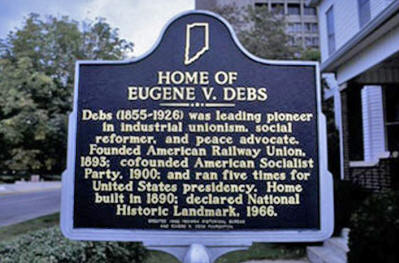|
Eugene Victor Debs 1855-1926
Eugene Victor Debs was born in Terre Haute, Indiana.
His parents emigrated from Alsace,
France, in 1849. According to the Monthly Labor Review, August 1991
issue,
Debs left school when he was 14
years old and took a job in the Terre Haute railroad shop, which
paid him 50 cents a day for scraping grease and paint off
locomotives.
In 1871, he became a locomotive
fireman. He joined the Brotherhood of Locomotive Firemen in
1875, and soon began serving as an organizer and recording
secretary for the union.
Debs was busy fighting for the workers and organizing their
struggle. To this end, he became founder of the American Railway
Union in 1893.
Supporters of labor unions had a field
day with the Pullman Strike, which lasted from May 11 to July
20, 1894. As president of the American Railway Union, Debs was the
leader of the strike. For this performance, Debs was put in jail for
six months, from May to November 1895.
Eugene V. Debs was a member of the American Socialist Party, whose presidential candidate
he was in the years 1900, 1904, 1908, 1912, and
1920, and which only made sense because Debs was a sturdy fighter and a
terrific orator.
The presidency never materialized for Debs. Instead, by fighting for labor and
social justice, he managed to raise enough
stink to get imprisoned for treason.
And it went down as follows:
On June 16, 1918, Debs spoke before the Ohio State Socialist Party Convention in Canton,
Ohio, in which he stated his opposing opinion of
 World War
One. Let's call this address the
World War
One. Let's call this address the
 Emancipation of the Working Class speech
or the Canton speech.
Emancipation of the Working Class speech
or the Canton speech.
On June 20, 1918, Debs was indicted by a
federal grand jury on ten counts under Section 3 of the amended
Espionage Act, also called the Sedition Act of 1918. The
Federal Judicial Center at Washington DC explains:
The prosecution used the Canton
speech as evidence in the case along with other of Debs' public
statements on the war and his praise for men and women who had
previously been convicted for disrupting the draft and for vocal
opposition to the war.
In September 1918, Debs was trialed in
the District Court of the Northern District of Ohio, before Judge
D.C. Westenhaver in Cleveland, Ohio.
On receiving his sentence on September
18, 1918, Debs
delivered his
 Address to the Court, said his views should be
protected by the First Amendment.
Address to the Court, said his views should be
protected by the First Amendment.
Debs appealed to the Supreme Court.
Justice Oliver Wendell Holmes and his
Supremes confirmed the judgment of the lower court and Debs was back
in prison.
The folks in Terre Haute were enchanted and
in 1992, they decided to stick a marker into
their soil.

EUGENE V. DEBS MARKER
TERRE HAUTE, VIGO COUNTY, INDIANA
More History
|